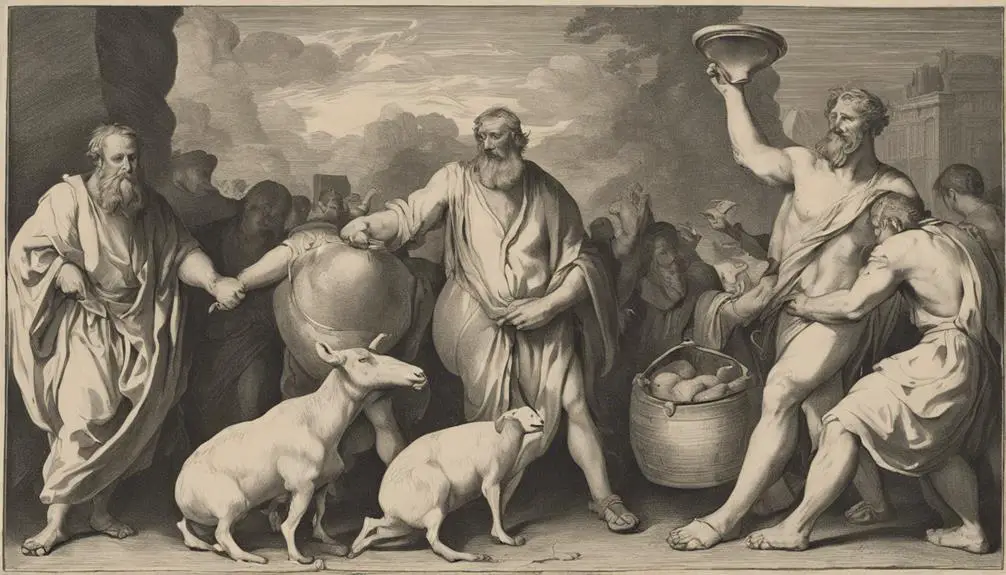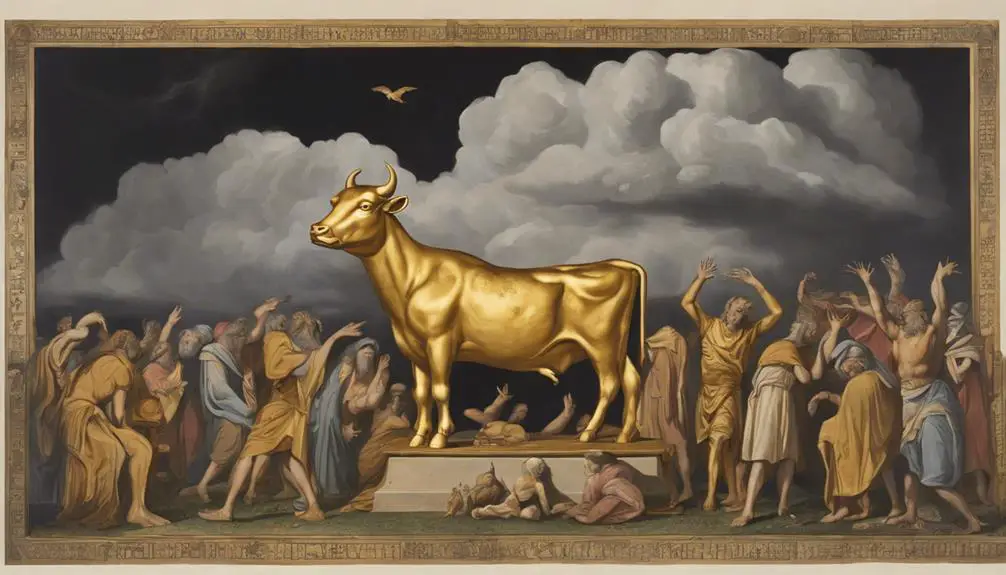Kneel with us as we explore the Biblical consequences of greed, promising both a captivating journey and profound insights.

Punishment for Greed in the Bible
In the Bible, the humble shepherd kneels in prayer while the greedy king hoards gold. You might've pondered, what does the Bible say about greed and its consequences?
It's a fascinating topic, wrapped in parables and real-life stories, revealing both the allure and the downfall of excessive desire. Would it change your view on material possessions, or perhaps, even your life's priorities?
Stay with us as we navigate through these intriguing biblical narratives, promising a thought-provoking journey.
Key Takeaways
- The Bible conveys greed as a destructive force, leading to spiritual and material ruin, demonstrated by King Ahab's downfall and the Parable of the Rich Fool.
- Individuals consumed by greed, such as Judas Iscariot, face severe consequences, including remorse, despair, and in Judas's case, suicide.
- Biblical narratives warn against greed escalating to idolatry, as seen in Israelites worshiping the golden calf, resulting in violation of God's covenant and subsequent punishment.
- Pursuit of earthly riches without spiritual richness, as illustrated in the Parable of the Rich Fool, is warned against in the Bible, highlighting the emptiness of material wealth.
Biblical Definition of Greed

In understanding the Bible's perspective on greed, it's crucial to first establish its specific definition of the term. You'll find that the Bible doesn't define greed as merely the pursuit of wealth, but rather an intense and selfish desire for something, often wealth or power, that goes beyond necessity and disregards the welfare of others.
This distinction is significant when considering 'Greed's Consequences' as presented in various biblical narratives. The Bible's teachings consistently warn against greed, portraying it as a destructive force that leads to ruin, both spiritually and materially. Moreover, the Bible underscores the temporal nature of earthly riches, emphasizing that they can't provide true happiness or security.
When discussing 'Biblical Prosperity', it's essential to note that the Bible doesn't condemn wealth or the desire for improvement. What it condemns is the unchecked pursuit of wealth at the expense of others' well-being and one's spiritual health. Therefore, biblical prosperity isn't about amassing material wealth, but rather about achieving a balanced life that respects and values spiritual growth, relationships, and the welfare of the community. This perspective offers a powerful counterpoint to greed and its consequences.
King Ahab's Downfall

One of the most vivid examples of the Bible's stern punishment for greed can be seen in the downfall of King Ahab. You'll note that Ahab's legacy isn't one of honor or righteousness, but rather one stained by greed and the influence of his wife, Jezebel.
Jezebel's influence was significant. It was she who manipulated Ahab into committing egregious sins, leading to his downfall. Their story serves as a potent reminder of the consequences of greed.
To emphasize, consider this table:
King Ahab's Actions |
Jezebel's Influence |
Resulting Punishment |
|---|---|---|
Coveted Naboth's Vineyard |
Encouraged Ahab's Greed |
Death in Battle |
Idolatry |
Introduced Baal Worship |
Family's Downfall |
Murder of Naboth |
Orchestrated the Act |
Divine Retribution |
Ignored Prophetic Warnings |
Discredited Prophets |
Israel's Ruin |
Unrepentant Greed |
Continued Manipulation |
God's Judgment |
These actions and their severe repercussions underline the Bible's view of greed. Ahab's legacy serves as a stark warning against giving in to avaricious desires, particularly when those desires are fueled by external influences, such as Jezebel's. Remember, the Bible condemns such behavior, and the story of Ahab reminds you of the dire consequences.
Parable of the Rich Fool

Shifting our focus from King Ahab's tale, let's consider the Parable of the Rich Fool, another biblical narrative that starkly illustrates the penalties of greed. This parable tells of a rich man who, despite his wealth, is described as a fool by God. Why? Because in his 'Fool's Prosperity', he fails to realize that earthly wealth is fleeting, and it's the spiritual wealth that truly matters.
The rich man's error lies in his Spiritual Foolishness. He's so preoccupied with his earthly possessions that he neglects his spiritual well-being. Instead of sharing his wealth or using it to help others, he decides to build bigger barns to store his surplus grain. But his life is demanded of him that very night, rendering all his wealth useless.
In this parable, you observe the biblical condemnation of greed, exemplified by the rich fool who gains the world but loses his soul. It serves as a stark reminder that greed not only leads to spiritual impoverishment but also to divine punishment. The parable underscores the biblical teaching that true prosperity is found not in material wealth, but in spiritual richness.
Judas Iscariot's Betrayal

Turning to the New Testament, you'll find the ultimate price of greed exemplified in the story of Judas Iscariot's betrayal of Jesus. Judas, one of the twelve apostles, was driven by avarice to betray his master for thirty pieces of silver, a significant sum at the time. His actions set in motion a tragic series of events culminating in Jesus's crucifixion.
Yet, Judas's remorse followed swiftly. Upon realizing the gravity of his actions, he attempted to return the blood money, symbolizing his regret and guilt. However, the chief priests refused, and in his despair, Judas ended his own life. His remorse, though palpable, couldn't reverse the treacherous course his greed had charted.
The betrayal consequences were severe. Not only did Judas lose his life, but he's also forever remembered as the archetype of a traitor in Christian theology. His story serves as a stark reminder that the pursuit of material wealth can lead to moral downfall and irreversible consequences. Thus, Judas Iscariot's betrayal stands as a potent illustration of the Biblical admonition against greed.
Lessons From the Golden Calf

While Judas Iscariot's story is a poignant example of greed's consequences in the New Testament, you'll find an equally powerful lesson in the Old Testament's account of the Golden Calf. Here, Idol Worship Consequences are vividly illustrated as the Israelites, succumbing to impatience and greed, construct a golden calf to worship. This act of idolatry signifies a direct violation of the covenant with God, leading to Divine Retribution Understanding.
The punishment for their greed and faithlessness is swift and severe. Moses destroys the golden calf, grinds it to powder, and makes the Israelites drink it, a drastic action symbolizing their complete and emphatic return to monotheism. Thousands are killed by the Levites, under God's command, for their part in the idol worship.
Thus, the story of the Golden Calf serves as a cautionary tale against greed and impatience, demonstrating the severe consequences of violating God's commands. It emphasizes the importance of faithfulness, patience, and adherence to divine laws. The punishment meted out, a vivid example of divine retribution, underscores the gravity of their transgressions, thereby reinforcing the moral code outlined in the biblical narratives.
Frequently Asked Questions
How Does the Modern Church Interpret and Teach About Greed?
You're taught in modern churches that greed's consequences can be severe. They stress the importance of avoiding greed and embracing philanthropy's role. By giving generously, you're acting in opposition to greed.
This isn't just about money, but also your time and talents. It's a vital part of Christian living. This approach reinforces the idea that greed is self-destructive, while generosity brings spiritual rewards.
What Is the Psychological Perspective on Greed as per the Bible?
From a psychological standpoint, you might view greed's impact as inherently detrimental. The Bible's interpretations often portray greed as a destructive trait, leading to personal downfall and societal discord.
It's seen as a form of self-obsession, causing disillusionment and separation from moral values. The psychological implications of such behavior can be severe, leading to stress, dissatisfaction, and a lack of fulfillment in life.
How Do Other Religions Apart From Christianity View Greed and Its Implications?
You're exploring how religions, apart from Christianity, perceive greed.
In Islam, greed is seen as destructive, leading to personal and societal harm.
Buddhism, on the other hand, emphasizes detachment from materialism, viewing greed as a hindrance to spiritual growth.
Both religions suggest that greed can lead to negative outcomes and advocate for self-control, generosity, and contentment.
What Are Some Real-Life Instances Where a Person Was Punished for Their Greed?
You've seen greed's impact on relationships, where one's insatiable desire for more ruins trust and love.
In business, the economic consequences of greed can lead to layoffs, bankruptcy, and even economy-wide recessions. Think of the 2008 financial crisis, where excessive greed led to the downfall of big corporations and affected millions.
Are There Any Bible Verses That Suggest Ways to Overcome Greed?
Sure, there are numerous Bible verses suggesting greed eradication strategies.
For example, Proverbs 28:25 advises, 'A greedy man stirs up strife, but the one who trusts in the Lord will be enriched.' This verse promotes trust in God as a way to overcome greed.
Additionally, Hebrews 13:5 encourages contentment and Biblical financial discipline, saying, 'Keep your life free from love of money, and be content with what you have.'
Conclusion
In conclusion, you've seen how the Bible sternly admonishes greed.
From King Ahab's tragic end, the rich fool's futile hoarding, to Judas Iscariot's fatal betrayal and the Israelites' golden calf idolatry, it's clear greed leads to destruction.
The Bible's message is unequivocal: greed corrodes the soul and veers you off the path of righteousness.
Therefore, strive for contentment and generosity, hallmarks of a life well-lived according to biblical teachings.



Sign up